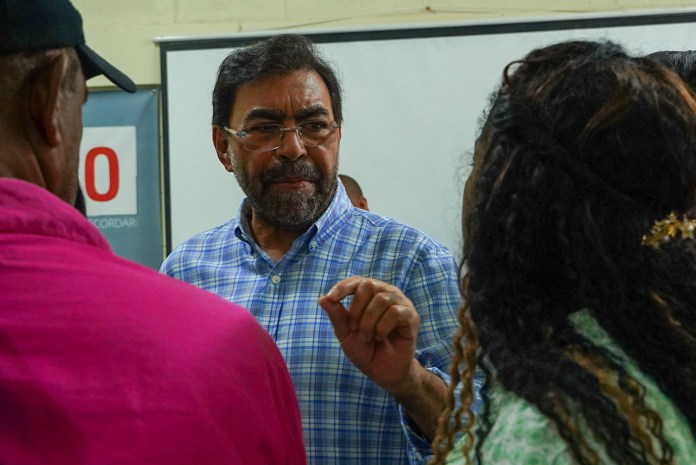Olmedo Caba Romano, executive director of the National Institute of Hydraulic Resources, INDRHI, facilitated a meeting between the beneficiaries of the population center being built in the Montegrande Dam Multiple Project and authorities from government agencies that have joint responsibility for the execution of this social component, where they responded to the future settled questions about its completion and the delivery of land for agricultural production.
Caba Romano indicated that the official institutions involved agreed to a review of the schedule to speed up the work and guarantee the delivery of the housing complex in a timely manner. He considered that these meetings are necessary to maintain a fluid dialogue between the parties.
“It is by expressing doubts and answering your questions that we are going to successfully complete this project,” said the official, while highlighting the importance that the social component of this great work has for President Luis Abinader, who has declared it as a priority of his government due to the impact it will generate in the socio-economic sphere.
The meeting with the community representatives, which took place in the Montegrande dam camp, was attended by the Governor of Barahona, Dionne Maribel González; the director of the Dominican Agrarian Institute, Guillermo García; the Deputy Minister of Soils and Waters of the Ministry of the Environment and Natural Resources, Fulvio Ureña; the executive secretary of the Water Cabinet, Rene Mateo, and representatives of other official bodies.
The director of the IAD stated that the entity is working to deliver the agrarian settlement in the shortest possible time, and at the end of the meeting he went together with technicians from the agency and representatives of the beneficiary sectors to the places where they will be settled.
Meanwhile, the Vice Minister of the Environment told those present that the lands that will be given to them, together with the support of the institutions, will allow them to become more productive farmers and expressed their interest in training institutes beginning to operate in the area to as soon as possible begin to increase their administrative capacities.
The Special Fund for Agricultural Development was represented by Bolívar Mateo, regional representative, and Orquídea Sánchez, provincial representative, who indicated that the projects to be implemented, including fish farming, will have zero-rate financing from the Agricultural Bank and permanent technical assistance. of the institution.
Regarding the speeding up of the construction of service buildings, Emil Medina, from the Ministry of Housing and Buildings (MIVED), reported that some components of the town center are again under tender, in compliance with the Law on Purchases and Contracts, since its current construction cost exceeds 25% of the amount of the awarded work. He indicated that in a few weeks the work of the church, the police detachment and the Primary Care Unit (UNAP) will resume.
Edesur’s representative, Ernesto Figueroa, pointed out that the power poles in the houses of the Los Güiros and Las Mesetas sectors will be reconsidered. He stated that his actions begin after the completion of the aqueduct and sewage system, which is more than 60% advanced. “The poles are already accounted for and ready, they have even been in the area for months, just to place them. Next week we are going to rethink the locations,” he added.
Social support entities were also present
The regional representative of the National Health Insurance (SENASA), Roberto Sánchez, indicated that a survey operation will begin with the purpose of giving way to a prompt delivery of the SENASA subsidized insurance to the farmers and their families.
Olga Sampoi, from Supérate, also told those present that this subsidy entity works so that the aid is delivered as soon as possible and that they can supply all these goods and services offered by the State.
More about this source textSource text required for additional translation information
Send feedback
Side panels

